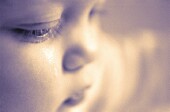
FRIDAY, March 7, 2014 (HealthDay News) — Younger siblings of children with autism may show signs of abnormal development or behavior as early as 1 year of age, according to a new study.
The findings suggest that parents and doctors should keep close watch for such symptoms at an early age among younger siblings of children with autism so problems can be addressed sooner, the researchers said.
The new study included nearly 300 infant siblings of children with autism and 116 infant siblings of children without the disorder. The children’s development was assessed at 6 months, 12 months, 18 months, 24 months and 36 months of age.
Researchers found problems in nearly half of the siblings of children with autism, with 17 percent developing autism and 28 percent having delays in other areas of development or behavior.
Among that 28 percent, abnormalities in social, communication, thinking or movement development were apparent by the time they were 1 year old. The most common types of problems were extreme shyness with strangers, lower levels of eye contact and delayed pointing, according to the study, which was published online recently in the Journal of the American Academy of Child and Adolescent Psychiatry.
“This research should give parents and clinicians hope that clinical symptoms of atypical development can be picked up earlier, so that we can, perhaps, reduce some of the difficulties that these families often face by intervening earlier,” study author Sally Ozonoff, a professor of psychiatry and behavioral sciences at the MIND Institute at the University of California, Davis, said in a university news release.
“Good clinical practice suggests that when children are showing atypical development they and their families should be provided with information about the child’s difficulties, clinical reports when practical and referrals to local service providers,” Ozonoff said.
Treatment will vary depending on the child and family, she added.
“The intervention approaches need to be chosen based on each child’s profile of strengths and weaknesses and each family’s goals and priorities,” Ozonoff said.
More information
The U.S. National Institute of Neurological Disorders and Stroke has more about autism.
Copyright © 2026 HealthDay. All rights reserved.

